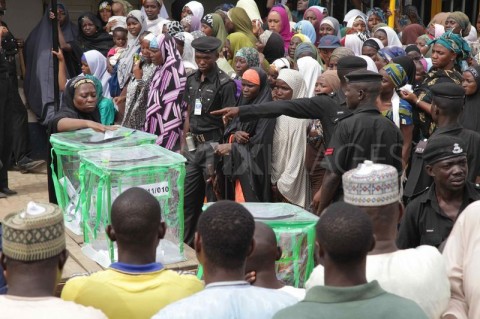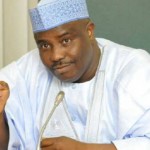22 Political Parties Regroup In Abuja, Seek Better Electoral Process
Featured, Latest Headlines Tuesday, May 19th, 2015
About 22 political parties which participated actively in the last general election have regrouped in Abuja with a resolve to launch themselves back to power in the 2019 polls.
The meeting held on Monday in Abuja, brainstormed on how to correct the mistakes of the past that led to their failure and chart the way foreward.
Among the parties that attended the meeting include Democrat Peoples Party, Peoples Party of Nigeria, Unity Party of Nigeria (represented by the founder of Oodua Peoples Congress, Dr. Fredrick Fasehun), Labour Party, Alliance for Democracy, Peoples Democratic Movement, United Progressives Party, New Nigeria Peoples Party, Social Democratic Party and African Democratic Congress.
The issues discussed include how to liaising with the Independent National Electoral Commission with a view to improving the electoral process and marshaling out a blueprint for the incoming administration of Gen. Muhammadu Buhari (retd).
The Secretary-General of Inter-Party Advisory Council and national Chairman of Progressive Peoples Alliance, Chief Peter Ameh, said the meeting was aimed at providing ways to improve electoral process in Nigeria.
He said that in the IPAC Code of Conduct, the meeting of Executive General Assembly comprises all the registered political parties.
“We have decided to meet to discuss all the other issues affecting political parties, their growth and development. As you know, we operate a multi-party democracy in Nigeria and we have a council that protects the growth and development of political parties. So we called a meeting, reviewed the issues and discussed collectively and brainstormed on other issues on the relationship that will exist between those who won election and those that lost”, he said.
Asked whether there were discussions on how to recapture power in 2019, the IPAC Scribe said issues were discussed at inter-party level because recapturing power is an interest that will preoccupy all parties.
Ameh said, “But despite that, we looked at issues on how to re-strategize and create a better environment for the electoral process come 2019, an environment that will encourage multiparty democracy and encourage more parties to win elections because this last election was not really encouraging. It has reduced the number of parties that won election in 2011 from about 7/10 parties to just about 2/3 parties.”
According to him, the rat race between the two major political parties went a long way in affecting the electoral victories of other registered political parties.
To correct this perceived anomaly in subsequent elections, the PPA chairman said the political parties would have to sit down with INEC and offer suggestions on how to improve the electoral process.
He said, “We are going to sit down with INEC and discuss, we are going to look at how to improve the voting system and make it right because the Option A4 of 1999 is still greater and more transparent than what we have today. We are still going to look at better ways to improve the electoral process.
“If we are going for full-blown electoral voting system, we should go for it to protect the interest of all registered political parties. In doing that, the mandate of parties which won election will not be lost. Also for parties which lost election, they will see it as a transparent process that will encourage acceptance of the results and include participation in the electoral process.”
The national chairman of IPAC and chairman of Gani Fawehinmi’s National Conscience Party, Dr. Tanko Yunusa, called on the incoming administration to be committed to its promise to fight corruption and carry other parties along.
He said IPAC will cooperate with Buhari’s administration for the overall interest of the country.
Related Posts
Short URL: https://www.africanexaminer.com/?p=23581






















